WHO and UNICEF confirm that polio vaccines are safe and have not expired
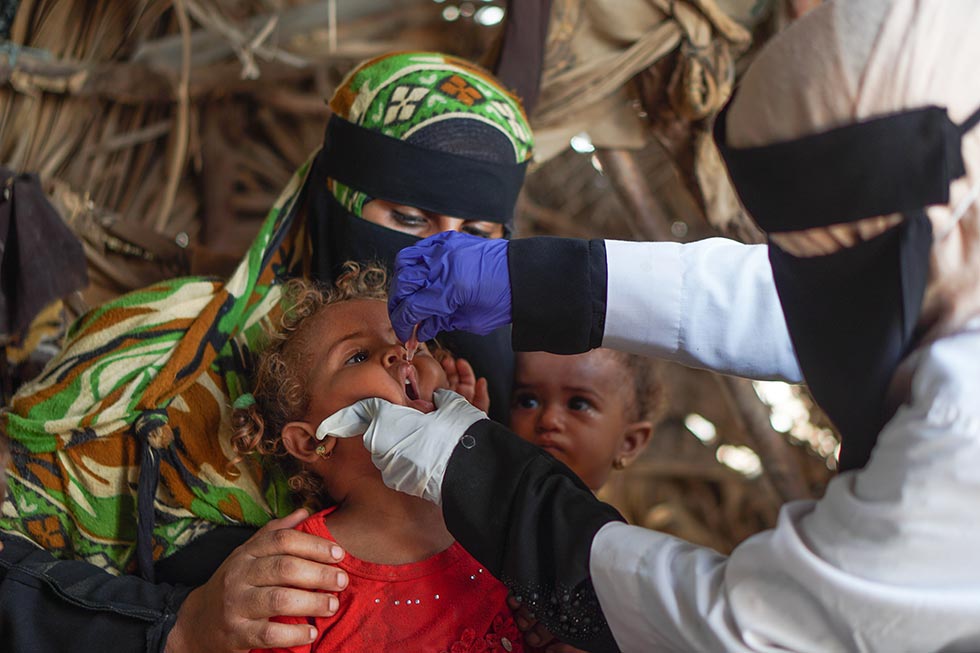
29 July 2020 – A lifesaving vaccination campaign is ongoing in 13 governorates in Yemen. Children are being provided with the polio vaccine and vitamin A micronutrient supplements to help protect them from preventable disease. Strict COVID-19 prevention measures are being practised in the interests of public health.
WHO and UNICEF confirm that the vaccines are safe for use. These vaccines have not expired and, as with our vaccine cold chains globally, have been stored safely.
WHO and Japan work together to sustain the mental health care system in Yemen
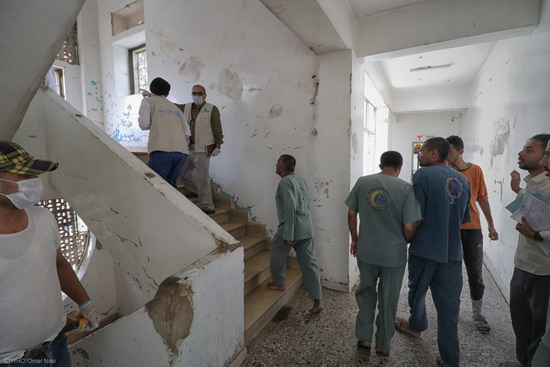 29 July 2020 – Prolonged war and conflict in Yemen have resulted in psychological burden and trauma of unprecedented magnitude. Hundreds of thousands of people, including children, have been impacted by adverse mental health stressors due to large-scale insecurity, displacement and food insecurity crisis.
29 July 2020 – Prolonged war and conflict in Yemen have resulted in psychological burden and trauma of unprecedented magnitude. Hundreds of thousands of people, including children, have been impacted by adverse mental health stressors due to large-scale insecurity, displacement and food insecurity crisis.
The collapse of the socioeconomic fabric and state institutions, resulting in a lack of social protection and basic public services, including health care, has compounded the situation of the most vulnerable, including people with existing mental health conditions and psychosocial problems.
Already vulnerable Yemenis are faced with COVID-19, threatening further to undermine their resilience, including access to treatment and health care for people with developing or existing mental health conditions.
But in a country where only half of the health facilities are still functioning, the mental health care system suffers from a shortage of funding, low commitment of authorities and scarcity of mental health professionals. Only 45 psychiatrists currently work in the country, of whom 36 are in the capital city Sana’a (one psychiatrist to every 700 000 individuals). The situation is further aggravated by the pervasive social stigma associated with mental health illness.
Al-Amal governmental hospital for psychiatric and neurological diseases in Al Safiah District in Sanaa is one of the few mental health facilities still receiving patients. It employs 172 health workers and 8 volunteers and receives almost 100 patients daily.
“The hospital is still functional, yet it requires substantial rehabilitation. It has not been rehabilitated in a very long time” said Adulmalik Mofadal, Water, Sanitation and Hygiene coordinator at WHO, who is supervising the rehabilitation works.
“Operating conditions at the hospital are hazardous. Inpatient rooms, bathrooms, the water connection system and even the walls, doors and windows need to be repaired,” he added.
Thanks to continued support from the Government of Japan, WHO will rehabilitate the health facility, including ensuring that patients are received with dignity and humanely.
“It’s all about giving better and more dignified living conditions to patients suffering from mental health conditions. It is also about making the hospital more friendly and raising awareness about the stigma mental health patients still face nowadays,” said Dr Philip Smith, Deputy Representative at the WHO country office in Yemen.
The Government of Japan supported WHO’s response in Yemen with more than US$ 11.5 million between 2015 and 2020, including a recent US$ 3 million contribution to mental health facilities. In addition to the rehabilitation of mental health facilities across the country, this support will ensure capacity-building, strengthening mental health governance and human resources development.
In 2019, WHO and partners were able to provide over 90 000 psychosocial support sessions and more than 14 000 mental health consultations. In addition to supporting 176 health facilities providing mental health and psychosocial support to those in need, including 47 hospitals, 63 health centres and 60 health units.
Health care workers face a double battle – COVID-19 in a conflict zone
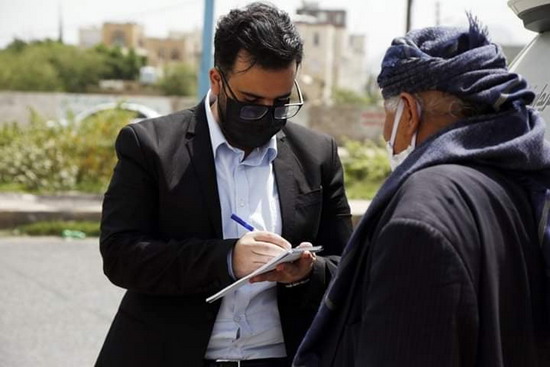 2 July 2020 – Dr Sami Al Hajj is a young doctor working at Science and Technology Hospital in Sana’ where he lives with his pregnant wife. Every day, he puts himself at high risk at his job.
2 July 2020 – Dr Sami Al Hajj is a young doctor working at Science and Technology Hospital in Sana’ where he lives with his pregnant wife. Every day, he puts himself at high risk at his job.
“COVID-19 has left Yemen and health care workers on the frontlines under severe pressure. We put our lives at risk to save the lives of our people. I have seen many doctors fall sick and be admitted to be put on ventilators and monitors, or worse, die. This has been the hardest thing to witness,” he says.
Yet Dr Sami shows no sign of giving up.
“The sensitive health situation in Yemen has made me grow. It made me aware of the magnitude of the needs in Yemen, and of my role to play as a health care worker,” he adds.
We are in this together
As the COVID-19 pandemic emerged in Yemen, Dr Sami received calls and messages from many people on social media worried about the virus and what it meant to them and their families. This made him think of the people working on the streets who don’t have phones or internet and who need medical guidance.
So he decided to start a unique initiative. He printed a poster offering people in the community to stop him for a free consultation if they needed to and placed it at the back of his car.
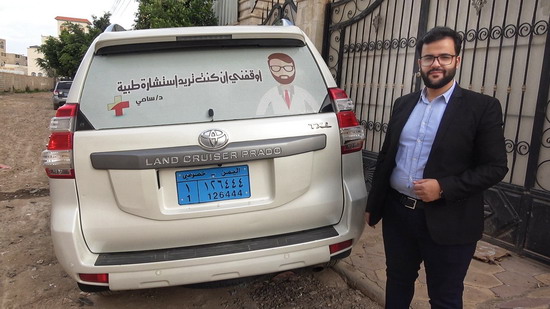 “People are scared. Many are unable to stay quarantined due to their financial situation. So they go out to their jobs knowing they are at high risk of infection. I wanted to be closer to them – easier to reach – whenever needed, to discuss a medical issue,” he said.
“People are scared. Many are unable to stay quarantined due to their financial situation. So they go out to their jobs knowing they are at high risk of infection. I wanted to be closer to them – easier to reach – whenever needed, to discuss a medical issue,” he said.
“I was quite surprised at how people reacted to the poster. It made me happy. In the more disadvantaged areas, I would have 30 people stop me in one day.” He adds. “Of course, I am not providing medical services, all I am doing is providing medical consultation services and referring them to the medical facilities where they can access medical support.”
This initiative reminded Dr Sami of the importance of the role health care workers play in the community, especially during a pandemic.
“I understand the fear of health care workers. It is a justified fear given the deteriorating health situation. But our people need us and our experience. I urge myself and fellow doctors to work this out together and to support each other during this challenging time to survive the pandemic.”
The risk COVID-19 poses to Yemen is unparalleled
Since the spread of COVID-19 in December 2019, the pandemic posed an unprecedented impact to health systems worldwide sustaining a dramatic rate of global transmission and spread of cases. The risk it poses to public health in Yemen, however, is unparalleled.
The health situation in Yemen has already been undermined by over 5 years of ongoing conflict and existing vulnerabilities before the war, which have caused extensive damage to the infrastructure and left the health system in Yemen unable to carry the load.
Only half of the health facilities in Yemen are fully functional, and those operating are under severe shortages of essential equipment, supplies and medical staff. Successive infectious disease outbreaks, such as cholera and diphtheria, continue to ravage the country and push more people into vulnerability. High rates of malnutrition among adults in the country is another alarming indicator of the compromised immunity and the vulnerability of the population to infectious diseases. Internally displaced people and refugees are among the most vulnerable due to poor access to sanitation services along with insufficient hygienic practices.
Health care workers need us now more than ever
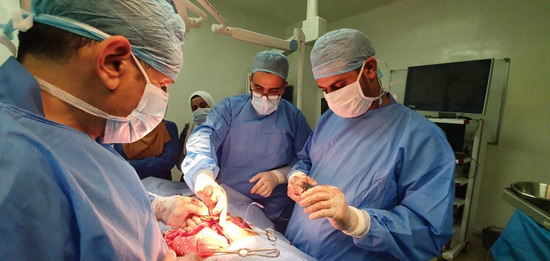 As evidenced by this pandemic the health care workforce is the backbone of any health system—these are the unsung heroes.
As evidenced by this pandemic the health care workforce is the backbone of any health system—these are the unsung heroes.
In Yemen, there is a huge lack of skilled health workers. And those who are available are vulnerable: there are no doctors in 18% of districts across the country and most health personnel have not received salaries for at least 2 years. This is in addition to the insufficient number of nurses and midwives coupled with weakened medical health education, unable to fill the deficit in human resources for health, compounded also by the brain drain where the most skilled health professionals have left the country for better opportunities abroad. Based on the existing knowledge of the health care workforce structure in place, medical and paramedical staff lack training on case management, infection prevention and control and use of personal protective equipment to face COVID-19.
The unprecedented financial gap faced under the Yemen Humanitarian Response Plan has led to a fiscal cliff that is threatening the ability to provide a living wage for over 10 000 health care workers who staff Yemen's functioning hospitals and health facilities.
Dr Sami is proof that one person can make a difference. This act of solidarity echoes the message of WHO—the only way we can beat COVID-19 in Yemen is if we do it together.
WHO and aid agencies continue to ramp up COVID-19 response efforts reaching more than 16 million people with awareness-raising activities, and supporting health workers across Yemen with over 227 500 units of personal protective equipment, including gloves, aprons, face shields and masks. In addition, the United Nations has been providing living wages to 9000 frontline health care workers who would otherwise be unable to support their families due to the ongoing conflict.
Government of Japan joins forces with WHO to strengthen mental health care system in Yemen
Yemen, July 2, 2020 – A new US$ 3 million contribution from the Government of Japan will give mental health and psychosocial support a fresh boost of support in health facilities across Yemen. The generous and continuous support of the Government of Japan plays a critical role in supporting WHO’s humanitarian response in Yemen, with donations amounting to more than US$ 11.5 million between 2015 and 2020.
Over 5 years of ongoing conflict have taken their toll on the mental health of the Yemeni people. Hundreds of thousands have been impacted by psychosocial stressors caused by war, poverty, illness and family separation, yet few have access to basic services and employment opportunities as the country goes through hardship.
COVID-19 comes as a new emergency on top of an emergency. People with existing mental health conditions and psychosocial problems are worsened by the impact of the COVID-19 pandemic. In populations already heavily affected by years of war such as Yemen, issues of service access and continuity for people with developing or existing mental health conditions are also now a major concern.
Mental health care services in Yemen
In Yemen, the mental health care system suffers from a shortage in funding, low commitment of decision-makers in advocating for such services, scarcity of mental health professionals, compounded by pervasive social stigma associated with mental health illness and the limited interest from humanitarian actors in strengthening mental health and psychosocial support systems.
Health authorities have limited capacities and resources as there are only 45 psychiatrists working in the country (36 in Sana’a and 9 psychiatrists in Aden (one psychiatrist to every 700 000 individuals). Also, the vast majority of people requiring treatment, including psychotropic drugs, have to pay for treatment.
This new injection of support will include strengthening mental health governance and human resources development. Furthermore, it will allow WHO to ensure that capacity-building, support and supervision are addressed in coordination with health authorities.
WHO response to the mental health crisis in Yemen
In 2019, WHO supported more than 14 000 mental health consultations, providing with its partners more than 90 000 psychosocial support sessions.
176 health facilities provided mental health and psychosocial support to those in need, including 47 hospitals, 63 health centres and 60 health units.
Note to editors
The 2020 Yemen Humanitarian Response Plan requires US$ 2.41 billion to assist more than 24.3 million Yemenis, which accounts for 80% of the entire population with humanitarian aid and protection. In 2020, WHO requires US$ 234.4 million to continue delivering its life-saving programmes. To date, the funding gap at WHO remains above 90%.
For more information, please contact:
Inas Hamam
Communications Officer
WHO Regional Office for the Eastern Mediterranean
Muneerah Al-Mahdli
Communications Officer
WHO, Yemen


